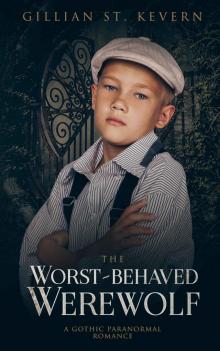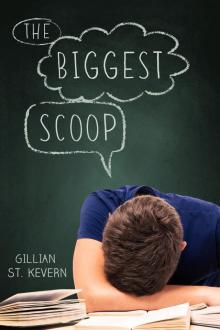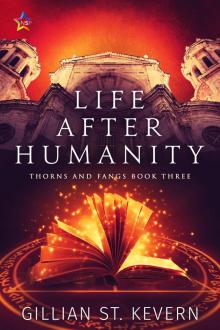- Home
- Gillian St. Kevern
The Worst Behaved Werewolf
The Worst Behaved Werewolf Read online
The Worst Behaved Werewolf
Gillian St Kevern
Contents
Foreword
Chapter 1
Chapter 2
Chapter 3
Chapter 4
Chapter 5
Chapter 6
Chapter 7
Chapter 8
Chapter 9
Chapter 10
Chapter 11
Chapter 12
Chapter 13
Chapter 14
Chapter 15
Chapter 16
Chapter 17
Chapter 18
Chapter 19
Chapter 20
Chapter 21
Chapter 22
Chapter 23
Chapter 24
Chapter 25
epilogue
Also by Gillian St Kevern
The Wing Commander’s Curse
Acknowledgments
About the Author
Foreword
To Millie and Rosie, two very, very, very good dogs, who protected me from hedgehogs.
1
“Ile de la Cité,” Scott announced, brown tweed jacket flapping behind him as he strode across the Petit Pont. “One of only two natural islands within the Seine. Until recently a hotbed of sin and vice.”
Julian glanced at the waters of the Seine, seeing the reflection of the grey stone embankments and the clouds above. “Any particular variety of vice?” No answer. He looked up. His tutor’s jacket tails vanished around a corner. Julian gave chase.
He caught Scott before the towering facade of an immense gothic cathedral. “Notre Dame.” Scott motioned over his shoulder, his eyes scanning the charcoal stalls and fruit hawkers. “Foundation stone laid in the tenth century. Finished thirteenth. Bells. Windows. Revolutionary wine store.”
Julian turned towards the cathedral. On this drab day, the stained glass was oblique, catching the shadow rather than the light. Incense mingled with the mustiness of old buildings and the bitter tang of the open sewer grate. He breathed in, digesting the smell of the city.
“This way.” Scott took off again.
Julian trotted after him. “Aren’t we going to see anything?”
“What do you think we’re doing?” Scott jogged down a stone-paved street, eyes on the opposite bank of the Seine. “Tour of the city, acquainting you with the sights of Paris.” He dived to the right, avoiding a collision with a photograph peddler. “Pont d’Arcole.”
Julian narrowed his eyes, following his tutor across the bridge. Was this a tour or a hunt? As they jogged along the embankments, he caught a whiff of tobacco cut with turpentine and pomade. He jerked his gaze up to his tutor, filled with suspicion.
Scott scanned the embankment below. His expression cleared. “Why, who have we here?” He darted down the stone steps to a figure seated before an easel. “Frank. What a surprise!”
Dawson raised his gaze from his canvas. His brown eyes were unfocused, looking at them from a long distance. He blinked, shaking his head. “Basil? What the devil—” His gaze fell on Julian. He swallowed his next words. “Well, this is unexpected.”
“Quite,” Julian agreed. “An astonishing coincidence.”
Amusement flickered in Dawson’s eyes as he stood. He wore his usual grey suit, but had replaced his tweed cap, adopting a grey hat with a blue band as a concession to Paris. “So astonishing, in fact, that one hesitates to call it a coincidence.” He raised an eyebrow at Scott.
Scott tugged at his tie. “I don’t know what you mean. Julian’s father has come to France for a cure and broke his journey in Paris. We’re taking in the sights—”
“Some sights more than others.” Julian eyed Scott.
Scott gave him a suppressive look. “—and it occurred to me that since your last letter was postmarked in Paris, we might just spot you at your work.”
Dawson’s gaze rested on Julian. “Is that so?”
Julian recognised that expression: someone who had things to say they did not wish him to hear. “There’s some Paris over there I haven’t seen yet. I’ll take it in while I have the chance.”
Scott furrowed his brow, but Dawson barely waited until Julian turned his back.
“I thought I made it clear I work best undisturbed,” he whispered.
“Of course, you do, old chap,” Scott soothed. “We won’t interfere, I promise. But I had to see you.”
Julian rolled his eyes. People fussed over the silliest things, from the state of carpets to when Julian slept or how much he ate. Even the apparently sensible Scott was no exception.
“You’ve seen me. Now clear off.”
“Come on, Frank,” Scott wheedled. “You’re somewhat glad to see me. Admit it.”
Of everything Scott could fuss over, why Dawson? Julian studied them. Both men were engrossed in their conversation. Dawson was tall, angular and self-contained. Compared to Scott’s comfortable plumpness, he appeared eminently more capable of taking care of himself. His smile was grudging. “All right. I’m not as annoyed as I should be.”
What business did Scott have to look rapturous? “One of these days, you’ll slip up and be happy to see me.”
Dawson snorted. “You know how I feel about you.”
Was it the fact that Dawson was so aloof? Nothing alarmed others more than a taste for solitude.
“A reminder wouldn’t hurt.”
Perhaps it was the moustache? Dawson kept his sandy whiskers impeccably groomed. Everything else came second to his art. He never seemed to notice the paint on his clothes or charcoal smudges on his skin, but his moustache was improbably perfect.
Dawson chuckled, his tone warm. “I trust you’re not angling for a refresher now. There is a limit to even the Parisian’s laissez-faire.”
Scott placed his hand on Dawson’s arm. “Perhaps we should continue this discussion later. Julian has very sharp hearing—and a bad habit of repeating what he hears at the dinner table.”
Julian turned away. His gaze grazed over Dawson’s easel. His shoulders locked, eyes widening. If the painting had physically grabbed him, it could not have taken a more complete hold of him.
Julian and Scott had taken in the Latin Quarter at a breakneck pace but had glanced over the work of the artists along the Seine. Most used the river as the foreground for the main focus of their work: the grand edifice of Notre Dame. Dawson alone painted the water. True, Notre Dame was there, reflection warped by the water’s movement into something unrecognisable in the Seine’s murky depths. But it was the river that was alive, challenging, twisting perceptions, threatening to take hold and drag the viewer under.
Julian drew a shuddering breath, only then realising he’d stopped breathing. He didn’t remember crossing the distance between himself and the easel, but he now stood in front of it.
It’s just a painting, the sensible part of his mind said, the part that ate breakfast and parsed Latin verbs. The other part of him, the part they didn’t speak about, was alert to danger. His nose twitched, wet paint and pipe smoke drowning out any danger signals. His ears caught only the crunch of Scott’s footsteps as he stood behind him.
What was wrong? Nothing in the painting explained this. Nothing? No. There in the right corner, a distorted shadow, as if a man stood on the bank. Or was he beneath the surface? Was he the menace that permeated the painting?
“Frank.” Scott’s voice made him jump. He’d forgotten his tutor. “How long has this been going on?”
Dawson’s knuckles were white where they gripped his pipe. “It’s not just me then. You feel it too?”
“This…” Scott shook his head, turning away from the canvas. “Tell me everything.”
Julian turned w
ith him. As he did, his skin prickled with awareness. Someone watched him.
“It’s a lingering unease.” Dawson nodded towards his canvas. “It started about the time I wrote to you. I could still dismiss it then as a nightmare. Now… No matter where I go, what I paint…”
Julian stepped back, focusing his gaze on the cobblestones. His ears strained, sorting through the myriad of city sounds for the one that didn’t belong.
“Where are you staying? Are you alone?”
Francis’s laugh was bitter. “Call me a coward, but after the third week, I couldn’t face my studio. My godmother has taken a suite at a hotel. I’m staying with her and her husband.”
Something shifted in the shadows, a furtive sound. Julian looked up, saw the flash of his eyes reflected in the startled gaze of the cat—cold blue eyes, ice on a winter pond—and then it moved, launching its grey body up the steps and across the street at full tilt.
Julian knew to hide his instincts, that well-behaved members of society did not sniff each other, that walking on two legs was better than four, but he had not learned to suppress this. When something ran, he chased it.
“Julian! Come back this instant!”
Scott might have saved his breath. Julian barely heard him. Focused only on the cat, he pelted down the Paris street.
2
Julian ran fast. The cat was faster, flying over the cobbled streets. Its small size was no disadvantage. It wove through pedestrians and streaked across streets with an ease a small part of Julian envied—but only a small part. Most of his attention focused solely on closing the distance between them.
He gauged the speed of an approaching carriage, decided the risk was negligible and darted in front of the horses. A furious yell and the clatter of hooves followed, but he was around the corner before the driver could raise his whip.
The cat paused on top of a wall. It flicked its tail and dived into a tiny alley way. Julian pursued.
Moving like this was a rare joy. The knowing part of his mind observed that the streets the cat led him down became less frequented, the houses shabbier, but the thrill of the chase was louder. Still, he suspected that if it wanted to, the cat could lose him any time.
Just as he had that thought, the cat clawed its way over a thick stone wall. By the time he reached the wall, the cat had vanished, only its scent hanging in the air. Julian put a hand against the wall, weighing his options. It was at least twice his height, perhaps more. No chance of him scaling it. The chase ended here. He turned, his gaze falling on a grand entranceway with a wide-open door.
A little too convenient, Julian decided as he stepped through the door. Even so. He was too curious to turn back.
It looked like a park, broad cobbled avenues lined with trees and bushes, some of which still had leaves. Deciduous, he decided, recalling a lesson with Scott. The bulk were thin skeletons, the ground beneath them carpeted with brown curled leaves. The main geographic feature were the graves sprouting at regular intervals throughout the park. Some were headstones or slabs, others miniature houses. The place smelled earthy, reminding him of walking with his fathers in the Foxwood Court woods early in the morning.
Julian breathed it in and smelled his adversary. He turned.
A boy about Julian’s age sat on the edge of a great granite slab. He had brilliant blue eyes, and his tangle of curls was grey, almost silver. His clothes were those of a Parisian labourer, but he had an insolence that belied his humble appearance.
Danger thrilled in Julian’s veins. “How do you do?”
The boy’s mouth curled. “You’re not ordinary, so don’t bother pretending.”
Julian buried his hands in his suit pockets. He did not take his eyes off his companion. Instinct urged him to remain alert, while the boy’s directness appealed almost as much as it shocked. “It’s not pretending so much as speaking a common language. Scott says it’s important—”
“Scott,” the boy interrupted. “Your tutor?”
Julian tilted his head. “You were watching us a while to catch that.”
The boy smirked. He stood, stretching, before stalking over to Julian. “I was. Long before you spotted me.” He glanced at Julian, eyes half-hidden by his curls. “I admit, I didn’t see you.”
Was that a compliment? “I wasn’t hiding.”
“No—but you’re not obvious either.” The boy paused in front of him. “What are you?” His tone was fierce.
Julian felt flattered. “Father says I’m not allowed to talk about that with strangers.”
The boy’s eyes flashed, but his smile was sweetness personified. “Your father means you’re not allowed to talk about it with ordinary mugs. He wasn’t talking about me.”
That was patently true, but still Julian hesitated. “We’re not completely sure.”
“You’re not like me. I could never have failed to spot you if you were. But you’re not human either.”
“No,” Julian agreed. “I’m not.”
“You smell human,” the boy accused. “You’ve spent too much time with them.”
Too much time? “I don’t have anyone else but humans.”
The boy looked at him. “You could have me.”
Julian’s chest surged with emotion at that. He shuffled his feet. “Who are you?”
The boy grinned. “Wouldn’t you like to know.”
“I would,” Julian assured him. “Very much.”
Surprise flickered in his companion’s eyes a moment. Then he smirked, patting Julian’s cheek. “I’ll tell you my name when you tell me your secrets.”
The only people Julian let touch him were his fathers. He opened his mouth to protest this familiarity, only to discover he wasn’t sure he wanted to. Instead he tugged at his collar, finding himself breathless. “Do you have a nickname?”
The boy’s mouth turned up at the edges. He glanced to one side. “Would you look at that?”
Julian turned. All he saw was the wide avenue, a man sweeping up leaves, and a scattering of people visiting the graves. “What do you mean?”
No answer. His companion was gone.
He couldn’t be gone gone. Julian scented the air, but because his companion had been still so long, it was hard to get a fix on which direction he’d taken. His nose caught smoke, a hint of cooking meat. The afternoon had dimmed while he’d been preoccupied. He smelled someone’s dinner, the scent eliciting an instant reaction from his stomach.
There was no trace of Scott, nor even of Dawson. Nothing except the cemetery, the mouldering leaves, and the damp cobblestones. Now that he wasn’t moving, the Parisian afternoon had a definite chill to it. He was alone.
Lost. Julian tasted copper in the back of his throat. He forced back his panic. Scott would be looking for him. So would his fathers. He couldn’t have gone that far. The cat—
Julian sucked in his breath. How had he been so stupid! Well brought up gentlemen did not chase cats. It would be remarked on. If he did not return soon, Scott would tell his father, and then it would be school—or worse.
Julian wrapped his coat around himself and retraced his steps.
The walk was long. Julian tried not to think of the welcome waiting him, focusing instead on tracking himself and the cat-that-wasn’t back through Paris. When their scent trail faltered, drowned out by the stronger scents of the restaurants or sewers, the details of the chase stood out clear in his mind.
The light faded, smoke pervading the air and overpowering his trail. Julian walked down broad stone avenues, buildings taking on a uniform appearance in the dark. He emerged on the bank of the Seine. He watched as a man in uniform set a ladder against a lamppost and scaled it. The light provided a warm glow, but little illumination. The city was entirely different by night—the Seine a murky shadow, the buildings bleached of their colour, the people strange, unknowable, hurrying to their destinations. Julian grasped just how big and strange Paris was.
He must find a policeman. Julian consulted his knowledge of French. Le g
endarme? His feet throbbed. Taking even a single step more was agony. He breathed in, summoning what energy remained, and caught a familiar scent, sandalwood mixed with notes of beeswax and ink.
He looked up. “Father!”
A man paced on the bridge, scanning the embankment. As he heard Julian’s word, he turned. Julian caught his scent then: starch, beard oil, and the underlying scent that belonged to Cross. Ignoring his aching feet, he dashed across the embankment and onto the bridge. He stopped just short of Cross, breathing too fast to speak.
“There you are.” Cross laid a hand on his head. “I was getting worried.”
Julian gave a fluttery gasp. His chest was full. He’d been told not to run off by himself, that he must listen to his tutor, and mind what Scott told him. “I’m sorry. I didn’t mean—it was an accident, it won’t happen again, I promise, please—”
“It’s all right.” Cross removed the scarf he wore. Pip’s scarf, his favourite. Julian felt a momentary pang of disappointment that it was just his scarf and not his father, and then Cross wound the scarf around him, enveloping him in the comforting scent of home. “Let’s return to the hotel. Your father misses you.”
Cross raised his walking stick. A carriage rumbled to a halt at once.
Julian stroked the fabric of the scarf. He was too tired to follow the exchange that followed, stumbling as he climbed into the carriage after Cross. “My stomach is empty, and my feet are sore.”
Cross snorted as he shut the door after him. “Given the account we’ve had of your afternoon, I’m not surprised. Perhaps next time you’ll think twice about chasing a cat.”

 The Worst Behaved Werewolf
The Worst Behaved Werewolf The Biggest Scoop
The Biggest Scoop Life After Humanity
Life After Humanity